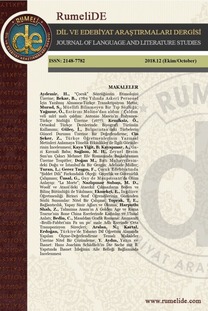Piano Lesson’ın politik okuması: Siyahların beyaz kültürde hayatta kalma stratejileri
Bu çalışmanın amacı, Amerikan oyun yazarı August Wilson’ın The Piano Lesson adlı oyununun politik okumasını yapmaktır. Oyun incelemesi boyunca, beyaz toplumda siyah kimliğin yeniden tanımlanması ve kolektif siyah hafızanın önemi tartışıldığı için ırk politikasının yanısıra sömürgecilik sonrası bakış açısından da faydalanılmıştır. Oyunun ana teması Charles kardeşlerin aile köklerini ve tarihlerini ifade eden bir piyanonun satışı hakkındaki farklı tavırlarının tartışılması üzerine kuruludur. Kardeşlerin bu satış hakkındaki birbiriyle çelişen tutumları, onların Amerikan toplumundaki farklı konumlanmalarını da ifade eder. Kardeşlerden Boy Willie, piyanonun satışını kendisine sadece güç ve otorite kazandıracak bir para kaynağı olarak görürken, diğer kardeş Berniece piyanoya atfedilen manevi değerleri takdir etmektedir. Aslında oyun boyunca Afro-Amerikan mirasını simgeleyen piyano, Amerikan tarihinde iki farklı ırk, iki farklı kültür, iki farklı aile ve iki farklı dönem arasında köprü vazifesi görür. Bu piyano, aynı zamanda beyaz toplumun hegemonyasında ezilen siyah ırkı da temsil eder. Sembolik olarak oyunun isminde de belirtildiği gibi piyanonun siyah kültüre verdiği ders ise, siyah ırkın bağımsızlığında Afro-Amerikalıların mirası olan sözlü gelenek ve ataları anmanın kaçınılmaz gerekliliği olmuştur. Oyun boyunca, Afro-Amerikan değerlerini ve mirasını koruma gerekliliğinin yanısıra, dini kimlik ve toprak sahibi olmak da siyah karakterler için güç, otorite ve statü kazanma ve böylelikle beyaz toplum tarafından kabul görme metotları olarak kabul edilir.
Anahtar Kelimeler:
Afro-Amerikan mirası, sessizlik, ses, sözlü gelenek, ataları anma
A political reading of The Piano Lesson: Survival strategies of black people in white culture
The aim of this study is to make a political reading of the American playwright August Wilson’s play, The Piano Lesson. Since the play discusses the redefinition of black people’s identity and the significance of the collective black memory in a white society, besides the politics of race, a post-colonial apprach is used as well. The main theme of the play discusses the different attitudes of the Charles siblings towards the sale of a piano which stands for their family roots and history. The siblings’ divergence about the sale also defines their standpoints in American society. While Boy Willie perceives the piano solely as a source of money to gain power and authority, Berniece appreciates the spiritual values attributed to it. As a matter of fact, throughout the play the piano as an African-American heritage becomes a bridge between the two races, two cultures, two families and two periods of time in American history. It also stands for the long-lasting suffering of black people under the hegemony of the white master. Therefore, as symbolically signified in the title, for the liberation of black people, the lesson that the piano teaches to black characters is the inevitable necessity of embracing the African-American heritages that are the oral tradition and the ancestor worship. Besides the necessity of preserving the values of African-American heritage, for black characters ownership of land and having a religious identity are accepted as methods of gaining power, authority and status and thus, being accepted within the white culture.
Keywords:
African-American heritage, silence, voice, oral tradition, ancestor worship,
___
- Althusser, L. (1971). Lenin and Philosophy and Other Essays, London: New Left Books.
- Baker, H. (1987). Modernism and the Harlem Renaissance, Chicago: University of Chicago Press.
- Bertens, H. (2001). Literary Theory- The Basics. London and New York: Routledge.
- Bogumil, M. (1999). Understanding August Wilson. Columbia: University of South Carolina Press.
- Campbell, N. & Kean A. (1997). American Cultural Studies- An Introduction to American Culture, London and New York: Routledge.
- Levine L. (1977). Black Culture and Black Consciousness, New York: Oxford University Press.
- Mariani P. (1991). Critical Fictions, Seattle: Bay Press.
- Morales, M. (1994). Ghosts on the Piano: August Wilson and the Representation of Black American History, May All Your Fences Have Gates. In Alan Nadel (Ed.), Iowa City: University of Iowa Press.
- Strinati, D. (1995). An Introduction to the Theories of Popular Culture, London: Routledge.
- Tekinay, A. (2000). Contemporary American Drama 1960-2000. Boğaziçi Üniversitesi Matbaası, İstanbul.
- Wilson, A. (1990). The Piano Lesson, New York, A Plume Book.
- ISSN: 2148-7782
- Yayın Aralığı: Yılda 6 Sayı
- Başlangıç: 2014
- Yayıncı: Yakup YILMAZ
Sayıdaki Diğer Makaleler
Fatma Zehra KARIŞMAN, Ahmet Hakkı TURABİ
Ergodik Edebiyat Ve Tasarımda Aktif Katılımlı Ergodik Yaklaşımlar
Avrupa Birliği ikincil hukuk tasarruflarının çevirisinde Almanca-Türkçe çözümlemeli çeviri yöntemi
Hannah Arendt’te düşünme etkinliği ve düşünsel yaşam eleştirisi
Kitâbu’l-‘Ayn ve Kitâbu’l-Cîm’de n-f-s (ن ف س) kökü ve türevleri
Paepcke’nin çeviri odaklı hermenötik yaklaşımında çevirmenin varlık kazanması
Yelda ARKAN, Saskia Maria BAHNER
Harezm bölgesi halfe ve bahşılarının çıraklıktan ustalığa geçiş ritüelleri: Fatiha alma
Resim sanatında kahramanlık anlayışı ve yüceltilmiş kahraman imgeleri
Hasan el-Bedrî el-Ḥicâzî’nin şiirinde hiciv ve tarihi olaylar
